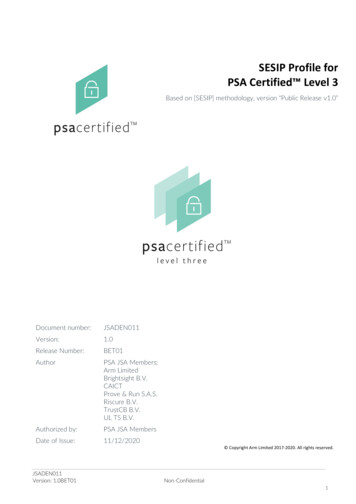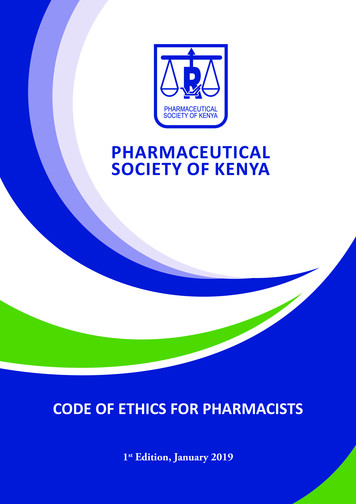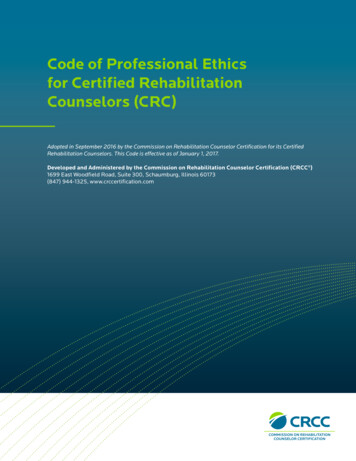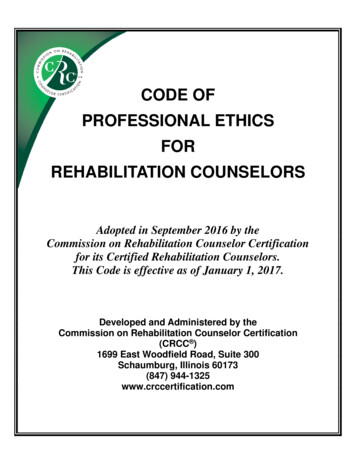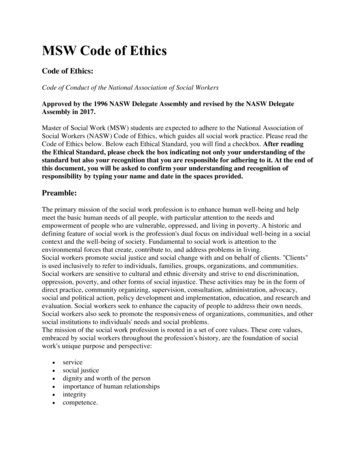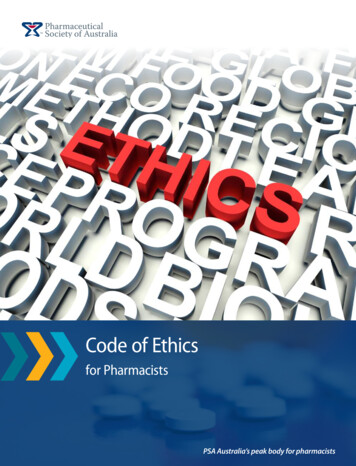
Transcription
Code of Ethicsfor PharmacistsPSA Australia’s peak body for pharmacists
Pharmaceutical Society of Australia 2017This publication contains material that has been provided by the Pharmaceutical Society of Australia (PSA), and may contain material provided by the Commonwealth andthird parties. Copyright in material provided by the Commonwealth or third parties belong to them. PSA owns the copyright in the publication as a whole and all materialin the guide that has been developed by PSA. In relation to PSA owned material, no part may be reproduced by any process except in accordance with the provisions of theCopyright Act 1968 (Cth), or the written permission of PSA. Requests and inquiries regarding permission to use PSA material should be addressed to: Pharmaceutical Society ofAustralia, PO Box 42, Deakin West ACT 2600. Where you would like to use material that has been provided by the Commonwealth or third parties, contact them directly.The review of Code of Ethics for Pharmacists has been funded by the Australian Government Department of Health as part of the PBS Access and Sustainability Packageincluding the Sixth Community Pharmacy Agreement. The work to update the Code has involved review by experts, public consultation and stakeholder feedback, andconsensus of organisations and individuals involved.The Pharmaceutical Society of Australia thanks all those involved in the review process and, in particular, gratefully acknowledges the contribution of the following individualsand organisations.Mark Lock, Professional Pharmacists AustraliaProject Advisory GroupGrant Martin, Australian Association of Consultant PharmacyShefali Parekh, National Australian Pharmacy Students’ AssociationGrant Kardachi, ChairChristopher Parker, Australian Government Department of HealthClaire Bekema, Australian Pharmacy CouncilCurtis Ruhnau, Pharmaceutical Defence LimitedJenny Bergin, Australian College of PharmacyRick Samimi, The Pharmacy Guild of AustraliaBernard Borg Caruana, Consumers Health Forum of AustraliaAnne Todd, Pharmaceutical Society of AustraliaBob Buckham, Pharmaceutical Society of New ZealandMichael Dooley, The Society of Hospital Pharmacists of AustraliaWilliam Kelly, Pharmacy Board of AustraliaProf Peter Little, Council of Pharmacy Schools: Australia and New Zealand Inc.Review Working GroupDr Shane Jackson, ChairElise ApolloniDr Betty ChaarJan DonovanElizabeth FrostPSA Project TeamDr Laetitia HattinghDr Kenneth LeePeter MayneProf Eleanor MilliganAdam PhillipsTrish RussellKay SorimachiClaire AntrobusAnna EzzyDisclaimerThis Code is intended to provide guidance on the expected standards of ethical behaviour of pharmacists towards individuals, the community and society. It has beendesigned for use by individual pharmacists to assess their own practice. It is the sole responsibility of the individual pharmacist to determine, all circumstances, how to applythe principles of this Code.The Pharmaceutical Society of Australia Ltd has made every effort to ensure that, at the date of publication, this document is free from errors and that advice and informationdrawn upon have been provided in good faith. Neither the Pharmaceutical Society of Australia Ltd nor any person associated with the preparation of this document acceptsliability for any loss which a user of this document may suffer as a result of reliance on the document and in particular for: use of the Code for a purpose for which it is not intended; any errors or omissions in the Code; any inaccuracy in the information or data on which the Code is based or which are contained in them; or any interpretations or opinions stated in, or which may be inferred from, the Code.Notification of any inaccuracy or ambiguity found in this document should be made without delay in order that the issue may be investigated and appropriate action taken.Please forward notification to policygrp@psa.org.au or psa.nat@psa.org.auISBN: 978-0-908185-01-6 (Digital)978-0-908185-02-3 (Print)Title: Code of Ethics for Pharmacists (2017)Date of Publication: 1 February 2017Publisher: Pharmaceutical Society of AustraliaEndorsed by the Pharmaceutical Society of Australia Board [January 2017]
ContentsAbout PSA4Purpose and scope of the Code5Structure of the Code9Summary of Principles10The Code11Appendix 1: Glossary and explanation of terms18Appendix 2: Comparison of the Principles22Code of Ethics for Pharmacists I Pharmaceutical Society of Australia Ltd.3
About PSAThe Pharmaceutical Society of Australia (PSA) is recognised by the AustralianGovernment as the peak national professional pharmacy organisation and representsAustralia’s 29,000 pharmacists1 working in all sectors and locations.PSA’s core functions relevant to pharmacists include:» providing high quality continuing professional development, education andpractice support to pharmacists;» developing and advocating standards and guidelines to inform and enhancepharmacists’ practice; and» representing pharmacists’ role as frontline health professionals.PSA is also a registered training organisation and offers qualifications includingcertificate and diploma-level courses tailored for pharmacists, pharmacy assistantsand interns.4Code of Ethics for Pharmacists I Pharmaceutical Society of Australia Ltd.
Purpose and scope of the CodePharmacists in Australia are facing new and evolving challenges related to anincreasingly complex healthcare system. In addressing these challenges, it isparamount that pharmacists practise ethically and professionally at all times, andknow how to respond to the specific needs of individuals and the community.Ethical, professional practice is central to PSA’s vision of “Improving our nation’shealth through excellence in the practice of pharmacy”.The PSA’s Code of Ethics for Pharmacists (the ‘Code’) articulates the values of thepharmacy profession and expected standards of ethical behaviour of pharmaciststowards individuals, the community and society. The Code underpins theprofessional practice of all pharmacists in Australia. Note that the Pharmacy Boardof Australia’s definition2 of ‘practice’ (adapted below) applies to the context of thePSA’s Code.To practice as a pharmacist means undertakingany role, whether remunerated or not, in whichthe individual uses their skills and knowledgeas a pharmacist in their profession. Practiceis not restricted to the provision of directclinical care. It also includes working in a directnonclinical relationship with clients; workingin management, administration, education,research, advisory, regulatory or policydevelopment roles; and any other roles thatimpact on safe, effective delivery of services in theprofession.Code of Ethics for Pharmacists I Pharmaceutical Society of Australia Ltd.5
All pharmacists registered with the Pharmacy Board of Australia (the ‘Board’)need to comply with a code of conduct which is common across most healthprofessions and applies to all health practitioners registered through theNational Registration and Accreditation Scheme (operated by the AustralianHealth Practitioner Regulation Agency). The overarching code of conduct forregistered health practitioners provides guidance on the ethical frameworkfor the delivery of effective health services. It provides important standards forpractitioner behaviour on:»»»»»»»»»»6providing good care, including shared decision-makingworking with patients or clientsworking with other practitionersworking within the healthcare systemminimising riskmaintaining professional performanceprofessional behaviour and ethical conductensuring practitioner healthteaching, supervising and assessingresearch.Code of Ethics for Pharmacists I Pharmaceutical Society of Australia Ltd.
As shown in the schema below, PSA’s Code sits within a broader hierarchyof guidance underpinning and supporting the practice of pharmacists. Itis important to emphasise that pharmacists must fulfil legal obligationsat all times and that no part of the PSA Code must be interpreted aspermitting a breach of the law or discouraging compliance with legalrequirements.Legislation Federal, state and territoryABPharmacy Board of Australia Registration standards, codes and guidelinesCode of ethics / Codes of conductCCompetency standardsDEProfessional practice / quality standardsProfessional / practice guidelinesFThe Board endorses PSA’s Code and advises pharmacists to consider itsrelevance to their professional practice and be guided by it in addition tocomplying with the overarching code of conduct.In its role of public protection, the Board may refer to or use the PSA Codewhen considering complaints or notifications involving the conduct orbehaviour of pharmacists. Breaches of this Code may result in notification tothe Board.In addition, compliance with PSA’s Professional Practice Standards and thisCode is a requirement for pharmacists to be able to dispense and supplymedicines on the Pharmaceutical Benefits Scheme3,4 and is also relevant tothe delivery of professional services by pharmacists.The values and principles in this Code are relevant to every pharmacistregardless of the role, scope, level or location of practice, for example:»for those entering or planning to return to the profession, the Codeidentifies the basic ethical and moral commitments of pharmacistcare and serves as a source of education and reflection»for those within the profession, the Code serves as a basis forpharmacists to monitor their own ethical conduct and that of theircolleagues»for those outside the profession, the Code provides guidance forassessing or learning about the minimum ethical conduct expected ofpharmacists.Code of Ethics for Pharmacists I Pharmaceutical Society of Australia Ltd.7
Ethical valuesThe Principles in this Code have been aligned to ethical values that embodyprofessionalism: Care, Integrity and Competency. These values reflect thecommitment of pharmacists to act in the interests of the patient (beneficence),do no harm or prevent harm from occurring (non-maleficence), respect selfdetermination (autonomy) and ensure fair and equitable allocation of resources(justice).There has been particular discussion regarding the meaning of “Competency”as one of the values. In the context of this Code, “Competency” describes thepersonal commitment of pharmacists to be proficient (competent), which liesat the core of providing appropriate care. Comparable values include capability,proficiency, excellence and quality.Cultural competenceThis Code recognises the ethical obligation of pharmacists to provide carein a culturally safe and responsive manner. PSA is committed to supportingpharmacists in a way that acknowledges and incorporates the importance ofculture, the assessment of cross cultural relations, vigilance towards the dynamicsthat result in cultural differences, the expansion of cultural knowledge, and theadaptation of services to meet culturally unique needs.Culturally safe, appropriate and competent care is a key strategy for improvingaccess to services and health outcomes for all individuals, including Aboriginaland Torres Strait Islander people.TerminologyDuring the review of the previous version of this Code, the term “patient” wasidentified as being the most acceptable in the context of healthcare serviceprovision and therefore the term is used throughout this Code. The term “patient”is also consistent with that used in the National competency standards frameworkfor pharmacists (2016).5 PSA recognises that other terms with equivalent meaninginclude, for example, consumer, person, individual and client.A term with an asterisk shown next to it on first occurrence in this document islisted in the Glossary (see Appendix 1).8Code of Ethics for Pharmacists I Pharmaceutical Society of Australia Ltd.
Structure of the CodeThere are seven statements of principle in this Code and these have beenaligned with ethical values of Care, Integrity and Competency as shown in thediagram below.A comparison of the Principles in the 2011 Code and this Code is shown atAppendix 2.A pharmacist makes the health andwellbeing of the patient their firstpriorityA pharmacistdemonstrates acommitment to thecontinual developmentof self and the professionto enhance pharmacypracticeA pharmacist workscollaboratively withothers to deliverpatient-centred careand optimise healthoutcomesA pharmacist practises and promotespatient-centred careA pharmacist exercises professionaljudgement in the interests of the patientand wider communityCARECOMPETENCYINTEGRITYA pharmacist acts withhonesty and integrity tomaintain public trust andconfidence in the professionA pharmacist only practisesunder conditions whichuphold the professionalindependence, judgementand integrity of themselvesand othersIn the Code, each Principle statement is supported by an explanatory sentencesection, followed by a number of statements of Obligations.Principle statementExplanatory sentence(s)A pharmacist:a. first Obligation statement.b. second Obligation statement.Note that the use of numbering associated with Principle statements and thelisting of the Obligation statements is necessary to facilitate identification andreferencing. They do not indicate any priority, order or hierarchy and should beregarded to be of equal importance.Code of Ethics for Pharmacists I Pharmaceutical Society of Australia Ltd.9
Summary of PrinciplesCARE PRINCIPLE 1A pharmacist makes the health and wellbeing of thepatient their first priority.CARE PRINCIPLE 2A pharmacist practises and promotes patient-centredcare.CARE PRINCIPLE 3A pharmacist exercises professional judgement in theinterests of the patient and wider community.INTEGRITY PRINCIPLE 1A pharmacist acts with honesty and integrity tomaintain public trust and confidence in the profession.INTEGRITY PRINCIPLE 2A pharmacist only practises under conditions whichuphold the professional independence, judgement andintegrity of themselves and others.COMPETENCY PRINCIPLE 1A pharmacist demons
health through excellence in the practice of pharmacy”. The PSA’s Code of Ethics for Pharmacists (the ‘Code’) articulates the values of the pharmacy profession and expected standards of ethical behaviour of pharmacists towards individuals, the community and society. The Code underpins the professional practice of all pharmacists in Australia. Note that the Pharmacy Board
